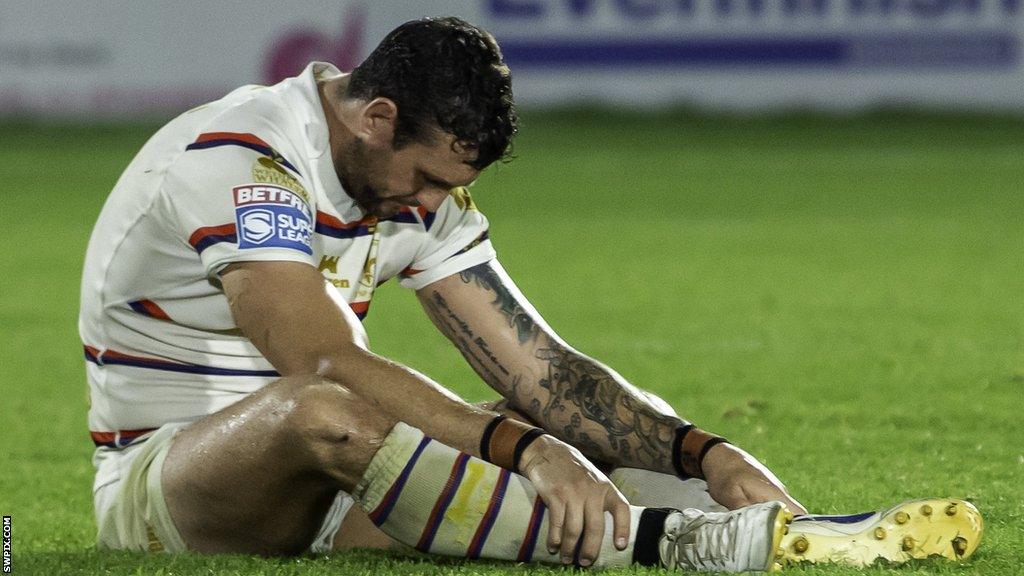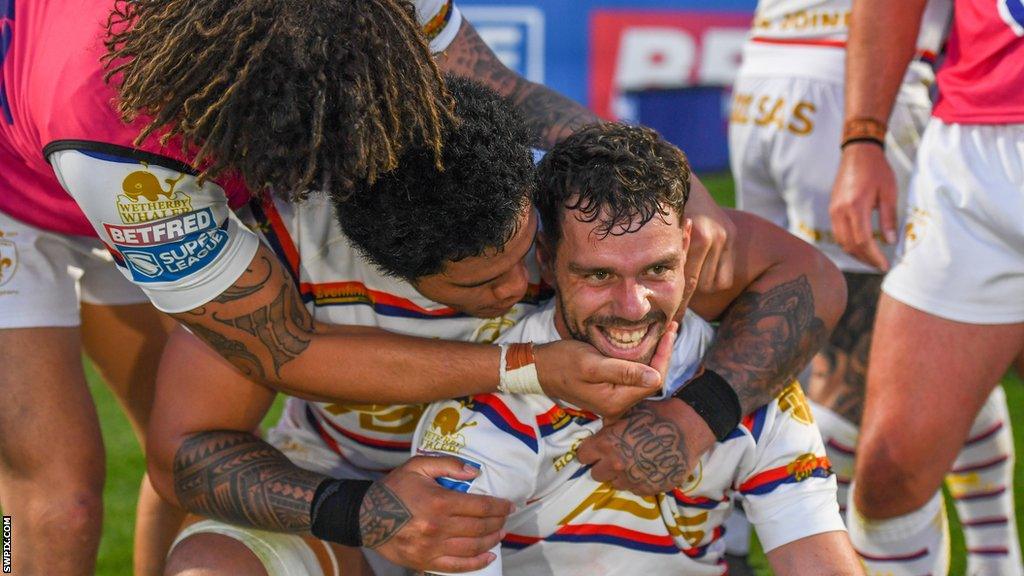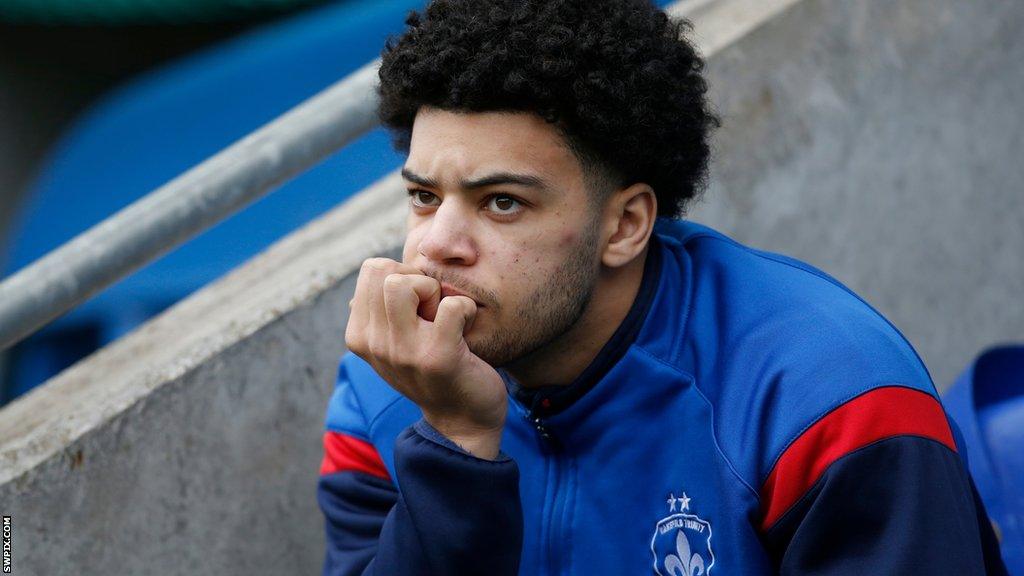Wakefield Trinity relegated after 24 years in Super League following Leigh loss
- Published

Jay Pitts, born in nearby Ossett, understands the significance of Wakefield's relegation as much as anyone at the club
After years of staving off relegation, Super League's great escapologists Wakefield Trinity have finally succumbed to the drop.
The 2023 season marks the end of their 24-year stay in the top tier, a tenure littered with heroic nights, last-ditch efforts and dramatic comebacks.
Friday's 20-19 defeat by Leigh means they can no longer catch Castleford to avoid dropping into the Championship.
This is the last year of promotion and relegation before licensing comes in.
Errors, errors, errors
Wakefield head coach Mark Applegarth described last week's defeat by Catalans, which all but consigned Wakefield to relegation, as "Groundhog Day" - in that poor execution and errors at key times were once again unpicking the positives from their play.
The same had occurred the previous week as another title challenger in St Helens were run close but still came away with the points.
"It's the tale of their season," Huddersfield assistant coach Luke Robinson told the BBC's Super League Show, in his role as a pundit.
"They started the season really inconsistently and Mark Applegarth spoke about those basic errors which have cost them.
"They had a bit of a purple patch when prop David Fifita came in, and [half-back] Luke Gale, but they've not consistently kicked on and managed to get the results."
It was the home loss to Castleford at the end of August which proved most costly, though, as it handed the Tigers a two-point buffer which they improved with victory over Hull on the same night Catalans beat Trinity at Belle Vue.
Bouncing back will take more than a successful Championship campaign next season, as the IMG-fuelled move to criteria-based meeting of standards puts extra pressure on Trinity in terms of facilities, fanbase and visibility in addition to on-field success, regardless of a shiny new stand.
Analysis: 'The waters have been choppier than ever in 2023'
James Deighton, BBC Radio Leeds rugby league producer
On 26 September, it will be 25 years to the day since the giant frame of prop Francis Stephenson crashed over the try-line at Huddersfield to draw Wakefield Trinity level with Featherstone Rovers in the inaugural Division One Grand Final.
Australian Garen Casey kicked the conversion as Andy Kelly's heroes secured promotion to the promised land, Super League.
Since then, Trinity's top-flight tenure hasn't always been plain sailing, though the waters have been choppier than ever this season - and the club has disappeared down the Super League plughole for the very first time.
So, where did it all go wrong? There were no obvious signs in Trinity's opening-day defeat at home by Catalans Dragons - on another night it could have been a winning start for Wakefield.
However, the points dried up and the defeats piled up with 15 successive losses in all competitions - and, as the impressive new East Stand rose from the Belle Vue earth, the team were just as steadily dismantling.
The loss of Max Jowitt in the very first game was just the start of the inconsistency around the club's selection spine which, while not the only reason for their poor season, would cost them dearly.
The clamour for a specialist full-back ultimately led Trinity to turn to Hull KR's Will Dagger, who managed to earn cult status among the fans during his time at the club. Lee Gaskell featured in just seven games and left the club in June, while back-up half-back Morgan Smith was ruled out with a season-ending injury in the same month.
The capture of Gale in May was seen as a 'last roll of the dice' by some, though it was some time before the former Man of Steel was able to make his debut. Once he did, his influence was clear to see as he helped his new side to four wins from six games, with one Trin fan pledging to ink themselves with a 'Messiah' tattoo if Gale could keep the club up.
But the upturn in form proved unsustainable and last Friday's home reverse by Catalans was Trinity's fifth successive loss, meaning defeat at Leigh brought to an end the club's stay in Super League, and deprived a Wakefield tattooist of a unique assignment.

Will Dagger enjoyed success as Wakefield beat Wigan thanks to his drop-goal, but the run of form was too short for Trinity
Time runs out on Trinity
It is only five seasons since Wakefield, then coached by Chris Chester, secured back-to-back top-five placings, just missing out on the end-of-season play-offs.
Those campaigns, much like 2012's play-off dalliance, were a rare change from the scrap at the bottom in Trinity's unbroken near quarter of a century in the top flight.
Perhaps their most famous act of survival was in dooming Castleford in their 2006 shootout, external on home soil, orchestrated by Cas-born John Kear in a thrilling win.
Fans, more out of relief than jubilation, will remember the nerve-shredding Million Pound Game against Bradford in 2015, the closest the Bulls have come to returning to the big time.
Meanwhile, 2019's four-way battle against the drop saw London relegated as Wakefield saved themselves, Hull KR and Huddersfield with victory over the Broncos at Belle Vue.
Since then, Leigh and Toulouse's disappointing campaigns spared the blushes of Wakefield and other under-performing teams, but 2023 has proven Trinity's downfall.
Coaching changes, player movement, injury blows

It will never be known what Lewis Murphy's injury absence meant for Wakefield, but his scoring form in 2022 suggested he would have been among the tries again
Wakefield's demise is made all the more hard to take by the fact that the new East stand, which was hoped to bring the club toward a brighter future off the field, is nearing completion as their on-field fortunes tumble.
Applegarth was promoted from assistant having helped nurture a number of academy graduates within the squad, and while his passion and commitment to his hometown club have been clear, he has been unable to save his side from slipping out.
The fact they had a chance of staying up after a 15-game wait for a first league win is testament to the fighting spirit Applegarth instilled within the squad, which has often been so key to their survival in recent seasons.
However, a porous defence which conceded 666 points before Friday's game, and an attack which had scored just 47 tries this season undermined their effort and perspiration.
Winger Tom Johnstone's pre-season exit to Catalans, and the subsequent season-ending injury to free-scoring Lewis Murphy, robbed head coach Applegarth of try-scoring prowess - while Jorge Taufua never replicated his National Rugby League pedigree in Super League before he was shipped out in June.
Investment was made to replace forward exits, and while existing players such as hometown favourite Jay Pitts and club captain Matty Ashurst belied the club's poor form with strong seasons of their own, those imports have not had the desired impact.
Renouf Atoni grew into his role, offering depth to a pack which missed the grunt of Jai Whitbread and Kelepi Tanginoa through injury for key periods.
But former New Zealand and Melbourne Storm NRL-winning forward Kevin Proctor was a disappointment, registering just 824 metres in 19 Super League games - an average of only 43 metres per match.